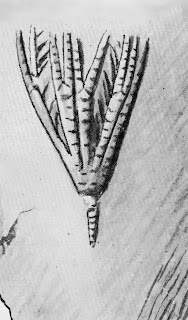Cyathocrinites roemerii (Troost, 1850) crinoid calyx fossil Plate 6 figure 11 drawn by Major Adolphus Heiman (1809-1862) from A Critical Summary of Troost's Unpublished Manuscript on the Crinoids of Tennessee by Elvira Wood 1909. This crinoid was found in the Carboniferous Period aged in the St. Louis Limestone of Duck River, Maury County Tennessee USA. It was assigned U.S. National Museum number 39944 and identified as a holotype. Elvira Wood refers to as Scaphiocrinus huntsvillae (Worthen).
Gerard Troost (1776-1850) does not list who the species is named after but it appears was one of two geologist brothers Friedrich Adolph Roemer (1809-1869) or Carl Ferdinand von Roemer (1818-1891).
UPDATE [December 2024]: The fossil was named after the younger Ferdinand Roemer. I found his 1860 book Die silurische Fauna des westlichen Tennessee / Eine palaeontologische Monographie in which he visited Troost in 1847 in Nashville. He writes (translated from German to English): "When
I returned from Texas in the summer of 1847 to Nashville, the capital
of the state of Tennessee, and found a very friendly welcome and
valuable instruction on the geological conditions of the country from
Dr. G. Troost, who has made a great contribution to the natural history
of the western states, my attention was particularly drawn to the
beautifully preserved Silurian fossils in the excellent man's rich
paleontological collection..."
Picture of the real fossil is below which is stored at the Smithsonian. Their database shows it is a holotype called Dinotocrinus roemeri (Troost in Wood, 1909).
 |
| Image courtesy of the Smithsonian Institution Specimen Catalog Number: USNM PAL 39944 Specimen GUID: http://n2t.net/ark:/65665/39ac4d2dd-9845-4878-8d40-90204c177ae3 Specimen housed in the collections of the Department of Paleobiology, National Museum of Natural History, Smithsonian Institution |


No comments:
Post a Comment